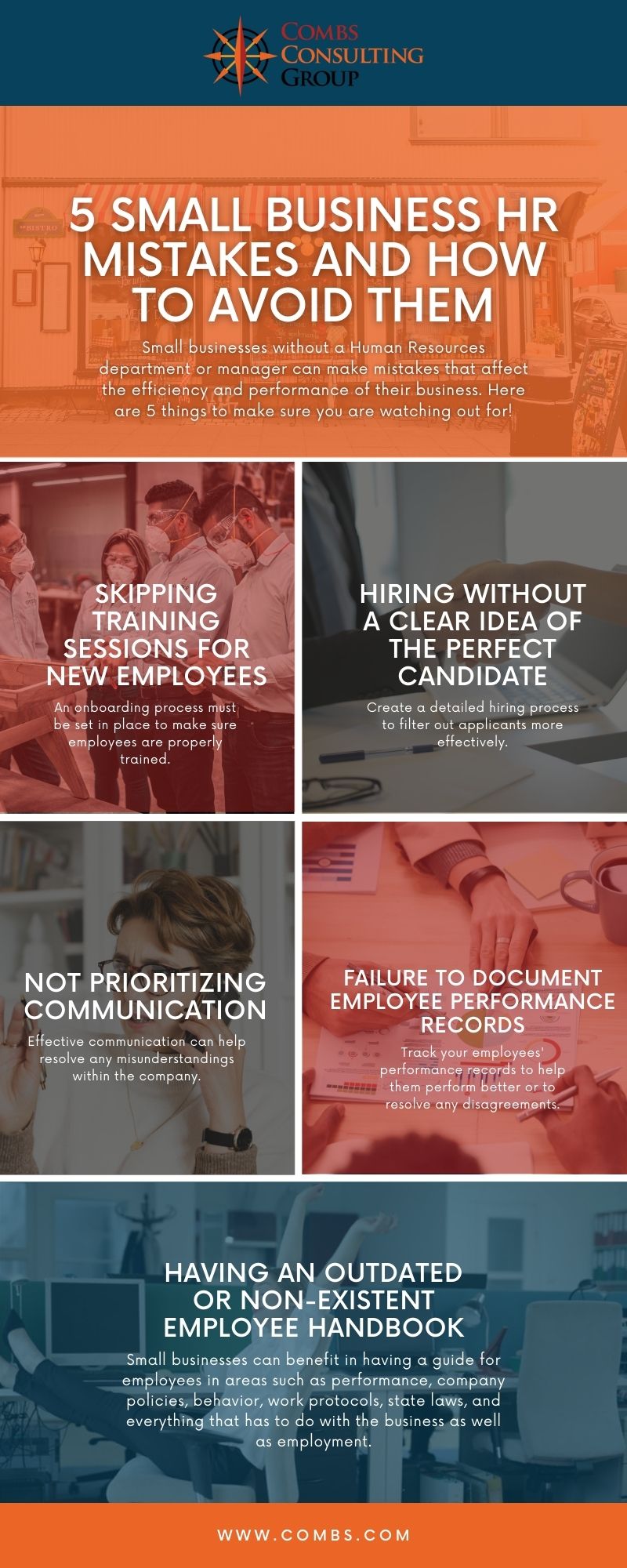Small business owners often find it difficult to manage all the ins and outs of their business, especially when they don’t have designated employees to help lift the load off the majority of the work.
Because of these overwhelming tasks, it’s easy to make mistakes that can cause serious consequences for the company. Among the most common areas that these mistakes occur in are in the company’s HR department.
To help you identify them, here is a list of mistakes that are easy to make when the human resources aspect of a business is involved…
Skipping training sessions for new employees
While onboarding has always been a must for any type of job in any industry, it’s also one of the most ignored parts of the beginning of employment. New employees don’t simply need to know where the break rooms are, who to talk to when they run into issues, where to look for answers when a recurring issue comes along, or what they’re meant to do before, during, and after their working hours.
Being the caretakers of the company’s future, employees need to have a broad knowledge about the ins and outs of the company’s processes starting from their very first day. While most companies will always reserve a few days to a week for orientation, they will need to have more in-depth training to be able to manage their day-to-day tasks more efficiently.
Hiring without a clear idea of the perfect candidate
Not having the correct amount and quality of training is already a big mistake for new employees. In 2013, it was reported that a single bad hire can cost small companies $50,000. All companies, big or small, have specific budgets for hiring. Whether their budget is big or not, no company will ever want to spend a tremendous amount on an employee that doesn’t provide value to their work.
Now, imagine hiring the wrong people for the job. Yes, these employees may have the skills and knowledge about the job… they may have learned from a university the things they need to accomplish at work… but how sure are you that they can do the job efficiently? Through a cohesive set of hiring strategies, of course!
When a small business practices a detailed hiring process, they increase the company’s chances of getting to know stellar candidates who can later become assets to the company. This hiring process not only needs to look into the candidates’ skills and experiences, but their ability to blend into the company’s culture as well. This way, they can easily involve themselves into the team, creating a lasting internal harmony.
Not prioritizing communication
Unlike large companies, small businesses have the ability to talk to their employees more closely, allowing for more conversations created with the human touch. While some small business owners may think that anything that’s happening in the company is known to everyone working there due to the small scale of employees working, it’s not always what’s happening. It’s fine to over-communicate things that are happening company-wide in order to keep everyone set on the same agenda.
If you’re not too sure about how to handle this, it’s always a good idea to seek the help of external HR resource management providers who can make sure that everything is communicated within the company and that your employees are well taken care of.
Failure to document employee performance records
Like all humans, employees will have their good days and bad days at work. Sometimes they’ll be productive, counter productive, or oftentimes they’ll be consistently stable. While it’s best not to invade them with performance evaluations every few months, you need to be able to track the good and bad performances of your company’s employees. Knowing what they’re having trouble with can help you understand what type of training they lack or if there’s a policy you have failed to communicate with them. Misunderstanding about anything company or coworker-wise can be resolved through communication. But it’s also important that you have a record that can attest to any concerns that you might want them to remember and correct. This also comes in handy during termination or anything that has to do with the employee leaving the company.
Having an outdated or non-existent employee handbook
To help establish a sense of priority, clear communication, and responsibility with the employees, there must be a written set of rules to serve as their guide. This can come in the form of an employee handbook which coincides with your policies as a small business owner as well as the state laws that cover your area of business. Having this guide will not only save you the hassle of decision making, but it can also save you from lawsuits or anything that can potentially endanger you or the company.
Running a small business can be a handful especially if you’re your own boss, HR Manager, Accountant, Marketer, and any type of position that your business requires. Thankfully, there are many solutions to help you keep the company together at no added expense. Avoid unnecessary mistakes by following the guidelines mentioned above and you’ll surely save yourself the hassle and extra efforts for resolution that the company might face in the future.

